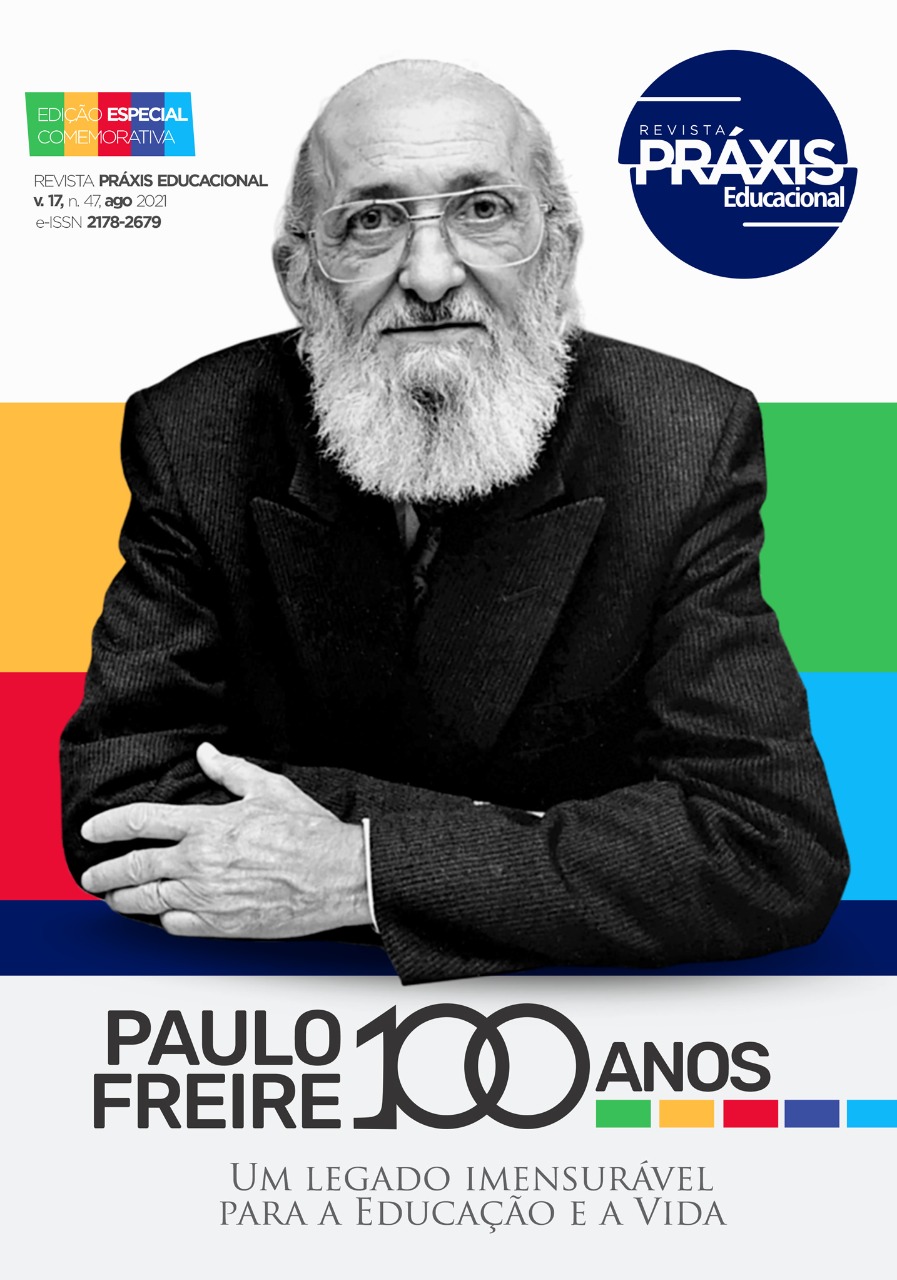A freirianian global legacy: a dialogue with Peter Roberts
DOI:
https://doi.org/10.22481/praxisedu.v17i47.9384Keywords:
Dialogue, Freire, Freirean legacyAbstract
In the phase of the proposed and expected discussions for the debate on Freire's thought on the occasion of the centenary of its birth, this text sought to establish a dialogue with one of the researchers who have, over decades, established a whole scientific, academic and social journey. , having as one of the contributions of reflection the work of the Brazilian teacher Paulo Freire. Thus, an interview was carried out with Professor Peter Roberts, whose production has crossed borders and broadened the discussion with and of Freire's thought. Peter Roberts is a professor at the University of Canterbury, Christchurch, New Zealand, in the field of Education. The objective of the interview, therefore, was to highlight the work of Paulo Freire in the focus of academic works carried out by Professor Peter Roberts, either establishing dialogic bridges between Freire and other authors, or looking forward to new paths that update Freire's thought.
Downloads
Metrics
References
Barreto, L. (2011). Triste fim de Policarpo Quaresma / The sad end of Policarpo Quaresma (M. Carlyon, Trans.). Rio de Janeiro: Instituto Cultural Cidade Viva.
Darder, A. (2015). Freire and education. New York: Routledge.
Escobar, M., Fernandez, A.L., Guevara-Niebla, G. with Freire, P. (1994). Paulo Freire on higher education: A dialogue at the National University of Mexico. Albany, NY: State University of New York Press.
Freire, P. (1972a). Pedagogy of the oppressed. Harmondsworth: Penguin.
Freire, P. (1972b). Cultural action for freedom. Harmondsworth: Penguin.
Freire, P. (1976). Education: The practice of freedom. London: Writers and Readers.
Freire, P. (1993). Pedagogy of the city. New York: Continuum.
Freire, P. (1994). Pedagogy of hope. New York: Continuum.
Freire, P. (1996). Letters to Cristina: Reflections on my life and work. London: Routledge.
Freire, P. (1997). Pedagogy of the heart. New York: Continuum.
Freire, P. (1998a). Teachers as cultural workers: Letters to those who dare teach. Boulder, CO: Westview Press.
Freire, P. (1998b). Pedagogy of freedom: Ethics, democracy, and civic courage. Lanham, Maryland: Rowman and Littlefield.
Freire, P. (1998c). Politics and education. Los Angeles, CA: UCLA Latin American Center Publications.
Freire, P. (2004). Pedagogy of indignation. Boulder, CO: Paradigm Publishers.
Freire, P. (2007). Daring to dream. Boulder, CO: Paradigm Publishers.
Freire, P. & Faundez, A. (1989). Learning to question: A pedagogy of liberation. Geneva: World Council of Churches.
Freire, P., Freire, A.M.A., & de Oliviera, W.F. (2014). Pedagogy of solidarity. Walnut Cove, CA: Left Coast Press.
Freire, P. & Macedo, D. (1987). Literacy: Reading the word and the world. London: Routledge.
Freire, P. & Shor, I. (1987). A pedagogy for liberation. London: MacMillan.
Horton, M. & Freire, P. (1990). We make the road by walking: Conversations on education and social change. Philadelphia, PA: Temple University Press.
Kirylo, J.D. (2011). Paulo Freire: The man from Recife. New York: Peter Lang
Kirylo, J. (Ed.) (2020). Reinventing Pedagogy of the Oppressed: Contemporary critical perspectives. London: Bloomsbury.
Mayo, P. (1999). Gramsci, Freire and adult education: Possibilities for transformative action. London: Zed Books.
Morrow, R.A. & Torres, C.A. (2002). Reading Freire and Habermas: Critical pedagogy and transformative social change. New York: Teachers College Press.
Peters, M.A. & Besley, T. (Eds.) (2015). Paulo Freire: The global legacy. New York: Peter Lang.
Roberts, P. (Ed.) (1999). Paulo Freire, politics and pedagogy: Reflections from Aotearoa-New Zealand. Dunmore Press: Palmerston North.
Roberts, P. (2000). Education, literacy, and humanization: Exploring the work of Paulo Freire. Westport, CT: Bergin and Garvey.
Roberts, P. (2010). Paulo Freire in the 21st century: Education, dialogue and transformation. Boulder, CO: Paradigm Publishers.
Roberts, P. (2012). From West to East and back again: An educational reading of Hermann Hesse’s later work. Rotterdam: Sense Publishers.
Roberts, P. (Ed.) (2015). Shifting focus: Strangers and strangeness in literature and education. New York: Routledge.
Roberts, P. (2016). Happiness, hope, and despair: Rethinking the role of education. New York: Peter Lang.
Roberts, P. (2019). Thesis supervision: A Freirean approach. In C.A. Torres (Ed.) The Wiley Handbook of Paulo Freire (pp. 521-534). Oxford: Wiley-Blackwell.
Roberts, P. (2020). Less certain but no less committed: Paulo Freire and Simone de Beauvoir on ethics and education. In J.D. Kirylo (Ed.) Reinventing Pedagogy of the Oppressed: Contemporary critical perspectives (pp. 135-146). London: Bloomsbury.
Roberts, P. (2021). Conscientization, compassion and madness: Freire, Barreto and the limits of education. Review of Education, Pedagogy, and Cultural Studies, 1-21. Available online at: https://doi.org/10.1080/10714413.2021.1890510
Roberts, P. & Freeman-Moir, J. (2013). Better worlds: Education, art, and utopia. Lanham, MD: Lexington Books.
Roberts, P. Gibbons, A. & Heraud, R. (2015). Education, ethics and existence: Camus and the human condition. New York: Routledge.
Roberts, P. & Saeverot, H. (2018). Education and the limits of reason: Reading Dostoevsky, Tolstoy and Nabokov. New York: Routledge.
Schugurensky, D. (2011). Paulo Freire. London: Continuum.
Smith, G. (1999). Paulo Freire: Lessons in transformative praxis. In P. Roberts (Ed.) Paulo Freire, politics and pedagogy: Reflections from Aotearoa-New Zealand. Dunmore Press: Palmerston North.
Torres, C.A. (Ed.) (2019). The Wiley Handbook of Paulo Freire. Oxford: Wiley-Blackwell.
Downloads
Published
How to Cite
Issue
Section
License

This work is licensed under a Creative Commons Attribution-ShareAlike 4.0 International License.
You are free to:
Share - copy and redistribute the material in any medium or format; Adapt - remix, transform, and build from the material for any purpose, even commercially. This license is acceptable for Free Cultural Works. The licensor cannot revoke these freedoms as long as you follow the terms of the license.
Under the following terms:
Attribution - You must appropriately give credit, provide a link to the license, and indicate if any changes have been made. You may do so in any reasonable way, but not in a way that suggests that you or your use is endorsed by the licensor.
There are no additional restrictions - You cannot apply legal terms or technological measures that legally restrict others to make any use permitted by the license.










